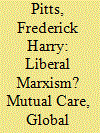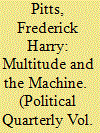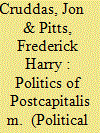|
|
|
Sort Order |
|
|
|
Items / Page
|
|
|
|
|
|
|
| Srl | Item |
| 1 |
ID:
172421


|
|
|
|
|
| Summary/Abstract |
This article surveys The Norman Geras Reader: ‘What’s There is There’, a recent collection of the work of Norman Geras, edited by Eve Garrard and Ben Cohen. The article explores the relevance of Geras’s attempted reconciliation between liberalism and Marxism to some of the key issues confronting the contemporary left: foreign policy and the failures of humanitarian intervention and non‐intervention; internationalism and the necessity for solidarity across borders in an age of nationalist populism; left approaches to totalitarianism and antisemitism; the possibilities and limitations of alternatives to and critiques of liberal capitalism; and the reinvigoration of utopian imaginaries and the futures they promise. It suggests that important lessons for the left can be unpicked from the contested legacy of the ‘decent leftism’ Geras represents, where reapplied in the wake of new political and diplomatic challenges.
|
|
|
|
|
|
|
|
|
|
|
|
|
|
|
|
| 2 |
ID:
174003


|
|
|
|
|
| Summary/Abstract |
There has been a proliferating literature on postcapitalist and post‐work futures in recent years, underpinned by policy proposals like the basic income and a reduction in working hours. It has gained increasing uptake within left electoral politics and policy making. The generational potency of these ideas require that we understand their theoretical roots. This article considers the interplay between the work of Michael Hardt and Antonio Negri and the new postcapitalism exemplified by the likes of Paul Mason and Aaron Bastani, as well as its relationship with intellectual currents around Corbynism and the wider contemporary left. Through a discussion of their latest book, Assembly, it will be seen that Hardt and Negri both inform, and are increasingly informed by, the postcapitalist and post‐work thinking popular on the left today—in particular at its ‘posthumanist’ fringes. However, this recent work is characterised by a series of tactical redirections that, rather than indicating renewal, reflect the potential collapse of this utopian framework for the future in the face of a rapidly unravelling global political context. Whilst the determinist understanding of social transformation cannot permit these setbacks, this shines a light on more general shifts in left strategy and analysis.
|
|
|
|
|
|
|
|
|
|
|
|
|
|
|
|
| 3 |
ID:
173993


|
|
|
|
|
| Summary/Abstract |
This article introduces the special issue on the politics of postcapitalism. Considering the theoretical foundations, empirical perspectives and political ramifications of claims made about a coming ‘post‐work’ or ‘postcapitalist’ society, it maps existing debates through a discussion of two key recent texts, Paul Mason’s Clear Bright Future and Aaron Bastani’s Fully Automated Luxury Communism. It first surveys how the relationship between labour market trends, technological change and wider political‐economic shifts is articulated in the postcapitalist literature. It then explores how concepts from Marx are deployed to depict social relations as a constraint on technological development and its utopian potentialities, leading to political demands for new class actors and electoral blocs centring on the new forms of economic and political activity associated with digital networks. It also considers the role of the state and how this theoretical and political approach envisions historical change, situating utopian visions of an incipient postcapitalist alternative to capitalism within the contemporary political context of authoritarian populism and challenges to liberal democracy. Finally, it explores the continuing relevance of humanism as a critical counterpoint to the social and philosophical agenda of present day ‘posthumanism’. It concludes that, in unfavourable political conditions, it would be strategically unwise to stake too much on an over‐optimistic approach to the unfolding future. This outlook, it is suggested, carries considerable risks and consequences for a contemporary left in search of a viable electoral coalition and route back to power.
|
|
|
|
|
|
|
|
|
|
|
|
|
|
|
|
|
|
|
|
|